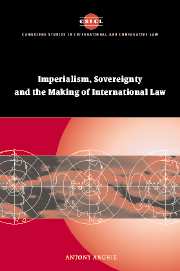Book contents
- Frontmatter
- Contents
- Foreword
- Acknowledgements
- Table of cases
- Table of treaties
- Introduction
- 1 Francisco de Vitoria and the colonial origins of international law
- 2 Finding the peripheries: colonialism in nineteenth-century international law
- 3 Colonialism and the birth of international institutions: the Mandate System of the League of Nations
- 4 Sovereignty and the post-colonial state
- 5 Governance and globalization, civilization and commerce
- 6 On making war on the terrorist: imperialism as self-defence
- Conclusion
- Bibliography
- Index
- CAMBRIDGE STUDIES IN INTERNATIONAL AND COMPARATIVE LAW
6 - On making war on the terrorist: imperialism as self-defence
Published online by Cambridge University Press: 05 August 2012
- Frontmatter
- Contents
- Foreword
- Acknowledgements
- Table of cases
- Table of treaties
- Introduction
- 1 Francisco de Vitoria and the colonial origins of international law
- 2 Finding the peripheries: colonialism in nineteenth-century international law
- 3 Colonialism and the birth of international institutions: the Mandate System of the League of Nations
- 4 Sovereignty and the post-colonial state
- 5 Governance and globalization, civilization and commerce
- 6 On making war on the terrorist: imperialism as self-defence
- Conclusion
- Bibliography
- Index
- CAMBRIDGE STUDIES IN INTERNATIONAL AND COMPARATIVE LAW
Summary
According to Buddhism there is nothing that can be called a ‘just war’ – which is only a false term coined and put into circulation to justify and excuse hatred, cruelty, violence and massacre. Who decides what is just and unjust? The mighty and victorious are ‘just’ and the weak and defeated are ‘unjust’. Our war is always ‘just’ and your war is always ‘unjust’. Buddhism does not accept this position.
Introduction
Imperialism has once again become the focus of analysis in international relations, initially, as a consequence of the victorious emergence of the United States as the single global superpower intent on exercising its unprecedented influence to ensure its own security and further its own interests and, following 9/11, the commencement of a ‘war against terrorism’ (WAT) animated by principles and policies that, when taken together, closely resemble, if not reproduce, imperialism. For many scholars who have focused on the history of the non-European world – and, I suspect, for many people in the Third World – imperialism has never ceased to be a major governing principle of the international system, and the only novelty of current developments lies in the fact that it has re-asserted itself in such an explicit form that it has become unavoidably central to any analysis of contemporary international relations.
Third World sovereignty suffers from a number of deficiencies that can be attributed to the operation of colonialism within international law.
- Type
- Chapter
- Information
- Imperialism, Sovereignty and the Making of International Law , pp. 273 - 309Publisher: Cambridge University PressPrint publication year: 2005

